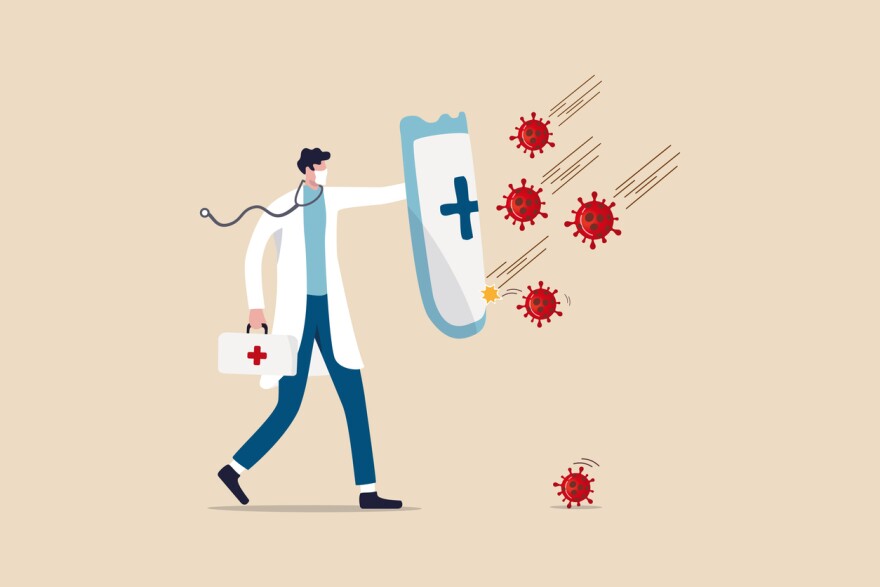Utah saw its highest number of COVID-19 cases and deaths Friday.
Gov. Gary Herbert has said he is considering new action by the state to limit the spread of the disease and will announce those plans early next week. Currently, masks are required when counties reach high levels of transmission, but there is no enforcement and no statewide mandate in place.
Some say these measures are not enough. Among them is Dr. Eddie Stenehjem, an infectious diseases physician at Intermountain Healthcare. He is calling for aggressive action, including a statewide, two-week “pause.”
This interview has been edited for length and clarity.
Caroline Ballard: Why aren’t public health guidelines and recommendations like mask wearing and social distancing working to slow the spread of COVID-19 in Utah?
Eddie Stenehjem: When Salt Lake County put in its mask mandate back this summer, we saw the curves come back down and we saw stabilization of cases and improvement. So we know that these measures can work and we've seen them work all throughout the country. The challenge we have in Utah is that they're not being consistently followed.
CB: Why aren't people following those guidelines?
ES: Well, that's a million dollar question there. We can speculate, and I think some of the things that we speculate about is the fact that people are tired. People are tired of this pandemic. They're tired of talking about it, and they're tired of having to sacrifice personally for the public good. It's a tough sell because the people that we're asking to sacrifice in terms of limiting their exposures to other peoples, they're not the ones that are getting critically ill and critically sick with this.
We can take a great example of looking at the 15 to 24 year old group. Schools went back in session. Two weeks later, we saw this huge rise. And they don't get terribly ill with this. Some do, but the vast majority will either be asymptomatic or be mildly symptomatic. The challenge with that population is that then they take it home and they spread it to their parents, to their grandparents and other community members.
CB: You've recommended a two week lockdown to slow transmission. What does that look like?
ES: In order for us to change something, we have to do something a bit more bold and more aggressive, and we can't just keep asking for the same thing and expect a different result. The way to do this — and this has been done in other countries, it's being done right now in Europe, and then there's also data to show that [it] works in other communities in the U.S. — is to take a temporary community pause.
That would be essentially a stay-at-home order where we go out for the essentials. And maybe it's something where we have schools in session, schools are fully masked, but we then limit all extracurricular and sporting activities after school. I don't think it has to look like a complete all or nothing. This doesn't have to be a full lockdown, but we have to stop the social interactions that are leading to transmission of this virus and just perpetuating the ongoing spread.
CB: What difference would these measures make? Especially since there are other places like the Navajo Nation and Europe where stricter measures were instituted that are still seeing another big spike right now.
ES: Yeah, and what you're seeing in Europe is that they're going back to a full lockdown. What that would look like here in Utah is that we would institute that, and it would be a temporary pause that would allow the community transmission rate to come down significantly. It wouldn't go to zero, but it would come down dramatically. Give our hospitals a break, and then go back to our standard public health measures, monitor the rise in cases as we go through the winter, and then potentially have to reinstitute another pause in order to bring the cases back down sometime in the future.
This may be something where we just have to institute these temporary pauses, these social pauses, where we are limiting our contacts in order to really control this pandemic until we have further vaccines available. Until we have more advanced therapeutics and also an increase in testing.
CB: How do you figure economic impacts into a two-week pause?
ES: This would potentially be very beneficial to the economy. What will happen if we continue on this pace, is that businesses will have to close. Large businesses will have large populations of their workers getting sick. And really, what a pause would do [is] allow us to get back to a lower community transmission rate to allow businesses to stay open, especially as we go through the holiday season. In terms of the commercial sectors, Thanksgiving to Christmas is one of their biggest seasons. This is not the time for us to have very high levels of community transmission.
CB: What would you say to people as they make their plans for family gatherings this holiday season?
ES: Family gatherings are going to be really, really hard. Right now with this high level of transmission, our recommendation is to limit your family gatherings to immediate family members that live in your home. If you are bringing family members into your home from other places here in Utah, you're going to put yourself at risk and we're going to see increased spread. There are ways you can mitigate this, but that's going to include masking in the house, limiting your gatherings to less than 10, ideally eating outside if possible. But really, I think the focus should be on reducing the level of transmission in the communities before we get to Thanksgiving.








